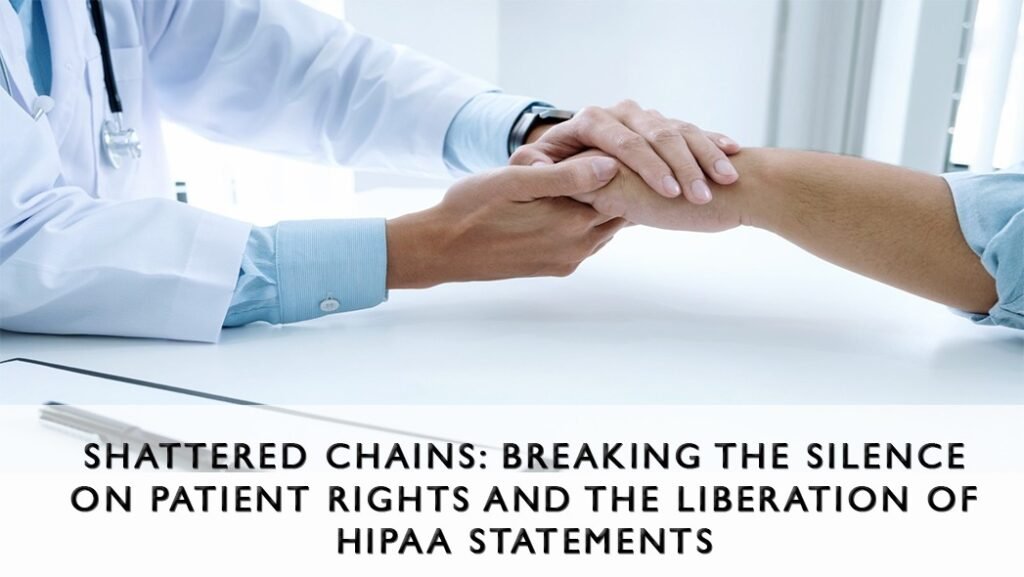Shattered Chains: Breaking the Silence on Patient Rights and the Liberation of HIPAA Statements
Introduction:
HIPPA Compliance is a culture that that mandatory for healthcare organizations to implement in business to protect the patient rights, security, privacy, and integrity of protected health information. It is a culture that requires the full participation of staff members and staff commitment to ensure the safety of patients. So, it takes abatement measures to encounter the need for more teamwork, patient-centered focus, and positive communication between healthcare providers and patients. HIPAA is essential for healthcare organizations to avoid legal and financial penalties. “Breaking the Silence on Patient Rights and the Liberation of HIPAA Statements” is a phrase or concept that links with patients’ rights and interpretation of protected information under The health insurance portability and accountability act. The article highlights the information related to it that may help.
Patient Rights
It refers to fundamental entitlements that an individual has when receiving healthcare services. These rights included respect, courtesy, dignity, responsive attention, and courtesy according to the needs of patients. To obtain the information from physicians and have the opportunity to discuss risks, costs, and benefits of appropriate treatment alternatives like risk and expense of forgoing treatment. In addition, the patient has the right to receive respectful care, know about their name and job, and caregivers, and respect the privacy of their medical condition. Patient medical records must be kept confidential. Emergency care treatment without any delay is a fundamental right of a patient. A patient has to complain to the doctor about any mistreatment. Patients can refuse to participate in any research study and can receive care without race, religion, color, national origin, or sex discrimination.
HIPAA (Health Insurance Portability and Accountability Act)
HIPAA was enacted as federal law in 1996 to protect and secure the security of patients’ healthcare information. The health insurance portability and accountability act is considered to establish standards for integrity and the digital exchange of patients’ health information. Under The health insurance portability and accountability act, everyone can control their health information and must consent to disclose it. HIPAA is a physical and technical safeguard that ensures the security of patient health information. HIPAA is critical to implement technical and physical safeguards combined with clear policies. The health insurance portability and accountability act provides coverage to entities like health plans, doctors, and healthcare clearinghouses is essential to comply with the regulations of The health insurance portability and accountability act.
Liberation of HIPAA statement
The liberation of The health insurance portability and accountability act statement needs to be clarified. Still, it possibly refers to effort or discussion around making regulations of HIPAA more accessible and also ensuring that patients are aware of how their information is being protected at the healthcare facility. HIPAA advocates changes in implementing and interpreting the rules to support patients’ rights better and ensure easy access to their information. So, it’s an act that lays out three rules for protecting patients’ health information. These rules are privacy, security, and breach notification rules. HIPAA creates national standards to protect patient’s health information from being disclosed without the knowledge and consent of the patient. HIPAA’s main provisions are privacy, transaction, enforcement rules, data type identification, and security. According to The health insurance portability and accountability act, every patient has a right to access their health information record within 30 days of making a request. If the patient cannot get a form within the specified period, it could violate HIPAA records. Losing a patient health record or device that exposes a patient’s history to unauthorized actors violates HIPAA. So, The health insurance portability and accountability act liberation is a right that better supports the patient to access their information.
Conclusion
By and large, HIPAA offers an individual many rights that require protecting the patient’s health information. At the same time, it is also essential to consider that The health insurance portability and accountability act offers some exceptions and limitations to these rights. These included public health purposes or, in some cases, where the law requires disclosure. The health insurance portability and accountability act ensures the current flow of health information. It also stipulates how PII (Personal Identifiable Information) maintained by health insurance and healthcare industries should be protected from theft and fraud. The health insurance portability and accountability act’s liberation statement also covers patients’ private information, like domestic violence. That is why it is always recommended to consult with legal experts or professionals in healthcare privacy and guidance of The health insurance portability and accountability act linked with the patient health information and HIPAA compliance.
For further details and daily updates please follow us on LinkedIn or join us on Quora.

